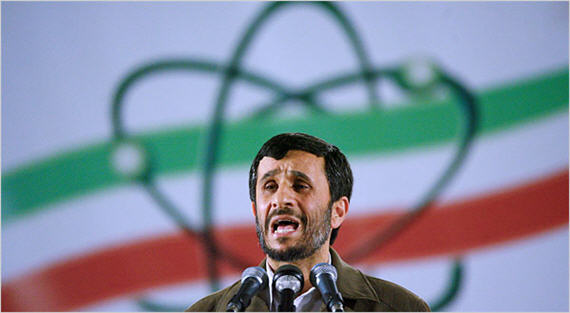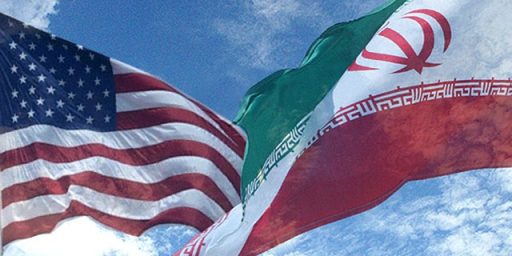The Costs Of Attacking Iran
An attack against Iran's nuclear weapons research facility won't be an easy thing.
Ralph Peters lays out a warning for the people advocating military action against Iran’s nuclear program on the theory that it will be a quick operation:
Let’s look at what “Bomb Iran!” really means: The Iranians may appear mad, but that doesn’t mean they’re fools, and they’ve studied the errors of other rogue states that sought nuclear weapons. The results? First, the Iranians have dispersed their research, development and production facilities. Second, they’ve fortified a number of vital sites in bunkers deep underground. Third, they’ve placed other link-in-the-chain laboratories and research sites in populated areas so that any attack upon them would generate large numbers of civilian casualties ― and very ugly images in the global media. Fourth, the Tehran regime has made this program a matter of nationalist pride. An attack on Iran’s nukes would be viewed as an attack on Iran, period, by the great majority of the population (even many regime opponents would “rally ’round the flag,” in an Iranian version of the 9/11 effect). Fifth, Iran would respond promptly and asymmetrically in the wake of such an attack ― unless its extensive capabilities to hit back were also attacked and disabled from the start.
(…)
How would Iran respond to strikes on its nuke facilities? Inevitably missiles would be launched toward Israeli cities ― some with chemical warheads ― but these tit-for-tat attacks would be the least part of Tehran’s counterattack strategy. The Iranians would “do what’s doable,” and that means hitting Arab oil-production infrastructure on the other side of the narrow Persian Gulf. Employing it mid-range missiles, aircraft and naval forces, Tehran would launch both conventional and suicide attacks on Arab oil fields, refineries, storage areas, ports and loading facilities, on tankers in transit, and on the Straits of Hormuz, the great chokepoint for the world’s core oil supplies. The price of a barrel of crude would soar geometrically on world exchanges, paralyzing economies ― exactly as Iran’s leaders intend. Ten-dollar-a-gallon gas would be a brief bargain on the way to truly prohibitive prices. And, in the way of the world, Tehran would not get the blame. We would.
None of what Peters lays out here seems out of bounds. It seems rather obvious that an attack on Iran’s nuclear facilities, whether by the United States or Israel, would not be the kind of one-off attack that we saw in Iraq in 1982, or in Syria in 2009. As Peters notes, Iran has learned from those examples to the point where an attack would require hitting multiple targets with weapons capable of penetrating hardened bunkers in multiple locations. We’d never know if we took everything out in one strike, and we’d have to worry about counterattacks. In other words, it wouldn’t be an “attack,” it would be a war:
So…if we are forced to attack Iran’s nuclear-weapons facilities at some point, what would it take to do it right and limit Tehran’s ability to respond with such devastating asymmetrical attacks?
At the most-basic level, we would need to conceive of the operation as a war, not just a brief series of raids. In addition to the standard requirements to knock out Iran’s early-warning and air-defense systems, we would have to strike the headquarters facilities of the Revolutionary Guards, the military and the various intelligence arms. We would need to destroy Iran’s combat aircraft on the ground, and then destroy any aircraft ― including passenger jets ― that could be used as flying bombs against oil facilities. It would be essential to destroy, early on, Iran’s navy and the Revolutionary Guards’ naval arm, right down to the Zodiac-boat level. We also would need to sink any commercial vessel that attempted to leave an Iranian harbor throughout the period of hostilities, since it could be used in an attack scheme. Not only would we need to disable Iran’s government and military communications infrastructure on the first day, but we also would have to disrupt civilian communications indefinitely. Then we would have to parry years of Iranian attempts to take revenge, not just regionally, but globally. We certainly would see a resurgence of state-sponsored terrorism ― and it could be taken to a whole new level.
Is America ready for another war in the Middle East, and one that could make Iraq and Afghanistan seem like a cakewalk by comparison? Frankly, I’ve got to doubt that the public support for such a commitment will be there regardless of who the President is unless we find ourselves in some situation where Iran has taken aggressive action against the United States. Yes, there’s a history of animosity against the Iranians that goes back to the Hostage Crisis (which began 32 years ago yesterday), but there was also a history of animosity against the regime of Muammar Gaddafi and yet the public never really got behind the minimal action that President Obama took there beginning in March. Would they really go along with an Iraq style war halfway across the world based on fears of an Iranian nuclear program based mostly on intelligence that, as I noted earlier this week, has been contradictory at best? Frankly, I don’t think they would.
Coincidentally, the Israeli newspaper Haaretz has an article today that paints a similarly grim picture of the prospects of war against the Islamic Republic:
How will an Israel-Iran war look if it breaks out eventually? This question is at the center of a new study compiled by the Defense Ministry. Researcher Dr. Moshe Vered writes that such a war could go on for a long time. He believes that the Iranian’s typical willingness to sacrifice many victims for a long period of time in a conflict with Israel will dictate a prolonged war between the two states, which will be difficult to end.
Dr. Vered, a physicist, occupies various roles in the defense establishment’s technology division. He published his study this week as part of a sabbatical at the Begin-Sadat Center for Strategic Studies at Bar Ilan University. He argues that the length of an Israel-Iran war “will be measured in year, not in weeks or days.” This stems from the Shiite perception by which one must fight and sacrifice for the sake of justice and to correct wrongs to Islam and to Muslims. “This outlook sees Israel’s existence as a wrong that must be corrected for the sake of world redemption. The achievement of this goal will only be possible once Israel is annihilated. The Iranians will continue fighting this war, as much as it is up to them, until they achieve their objective, despite the heavy toll that will be exacted in battle,” Vered writes.
Vered argues further that only the fear the Iranian regime being toppled could bring such a war to an end. But, it seems unlikely that Israel will be able to pose a real threat to the Iranian regime, and “in the absence of a way out, acceptable to both sides, the war could continue for a very long time.”
Vered mentions the fact that the Iran-Iraq war, in the 1980s, lasted eight years. Iran fought many years to achieve its demands – to correct the basic wrong of Iraq’s invasion into its territory, Iraqi recognition of its culpability, and the removal of the head of the Iraqi regime Saddam Hussein.
Iran paid an inconceivable price in that war – half a million dead and economic damage higher than the country’s entire oil income in the 20th century – before it agreed to a ceasefire. The ceasefire came only when there was a real danger that the Iranian regime would not survive.
(…)
Vered rejects the assumption that in the absence of a shared border, the Israel-Iran war will be fought only with surface to surface missiles. Such warfare shouldn’t last a long time because Iran’s supply of long-range missiles isn’t large. However, he writes, it is more plausible to assume that Iran will want to continue the fighting against Israel via messengers: Syria, Hezbollah and Hamas, and maybe even an Iranian force on Syrian soil, as part of a defense treaty between Tehran and Damascus. He plays down the likelihood of a short confrontation (Israeli assault followed by a punishing counter assault and then an immediate ceasefire under international pressure while both sides realize that the war has played out), he thinks that the ideology of the Iranian regime will dictate a prolonged war. Yes, this isn’t exactly what you would call relaxing reading material for the weekend.
No, it’s not, but it’s a must-read for anyone who thinks about these issues. It stands as a helpful counterweight to the arguments made by the John Bolton’s of the world who seem to argue for military action against Iran on every day that happens to end in a “y” and dismiss any concerns about the consequences of such action. It’s very unlikely we’re talking about a one-off bombing run here. Instead, we’re talking about a prolonged campaign that could potentially ignite a spark of terrorism against the United States and Israel around the world. Would that really be worth it, especially when we don’t even know if we’d be successful in knocking out the nuclear program? I have serious doubts about it to say the least. Hopefully, this is exactly the kind of assessment that the people who actually make decisions in the United States and Israel and, hopefully, they’ll be honest with the public if they ever do decide to travel down this road because we’ll all be living with the consequences of their decision.
H/T: Stephen Green







If you strike at a king, you must kill him.
I’ve never bought the ‘hardened target’ argument — a complex, interconnected system is easily broken.
But I do buy the retaliation argument. Israel is good but they are not us. They do not have the capacity to completely disarm Iran. Even for us it would be tough. And even if we gutted them militarily, they have many terrorist assets.
I always think when you’re looking at a war, look first at the map. Persian Gulf, Straits of Hormuz, Iraq, Afghanistan, Pakistan. . . That’s one bad map. That’s not Libya.
Sheer madness. And completely unnecessary. Egypt, Tunisia, Yemen, Libya….and Syria’s foundations are cracking…what is called for is the deployment of high-power wireless data routers combined with continuous drops of smart phones into Iranian hands so they can keep in touch with the actual world, and come to their own conclusions.
The current generation of Mullahs will not be replaced by the same. The world has passed them by, and now only Dotage now prevents it. Add obscene wealth, and the same thing is happening in America. I mean, you know the world has changed when the Irish close their Vatican embassy!
I kinda feel sorry for the neocons.
They are running out of credible enemies.
Truly, an existential threat to them.
Not that I think it’s a good idea (my ’03 F150 gets 15 mpg and I like to drive it) but why did I think Israel has the H Bombs to penetrate Hardened targets?
Per WikiP: Israel is currently believed to possess between 75 and 400 nuclear warheads with the ability to deliver them by intercontinental ballistic missile, aircraft, and submarine.
Oh, that’s why.
What does John Bolton and his ilk think would happen after such a strike?
Maybe they are the mad fools!
“Ralph Peters lays out a warning”
If Old Blood and Guts thinks its a bad idea, it’s a very bad idea.
Even the talk of such action is such insanity and the people doing the talking should be put away in the institute for the criminally insane.
And the buried treasure is a depression when the flow of middle eastern oil is disrupted.
First, I state categorically that I do not want war in any guise, and I hope that the Israeli-Iran situation can be resolved peacefully. But, this article by Peters does parallel what I have written earlier in exploring the possible scenarios of their engagement. It is important to us because of the threat Iran poses to the US with their worldwide sabotage capabilities, and the quite likely probability that Israel will sooner or later go for the attack as a matter of national survival, and could well drag the US into the battle, or even convince us that we should join the attack.
Peters goes on to lay out some more difficulties, such as nuclear facilities located in populated areas–deliberately–which has been known for some time. He also confirms my assertion that any attack had to be all out destruction of iran’s military capabilities, communications, and air defenses. He likewise confirmed that Iran has worldwide capabilities to perform bombings on US facilities, should they desire, in retaliation for an attack on Iran.
He did not address the possession of EMP weapons by Israel, which is the critical weapon they must have to ensure success in attacking Iran. Such a weapon would disable virtually all electronics and electricals in a wide area, even most of Iran, for a period of days, or until repairs could be instituted. This opens Iran’s airspace for the IAF to do their damage to all of Iran’s military. More specifically, it ensures that Israel’s C-130 transports could execute multiple missions over Iran carrying GPS-guided super MOABS (Mother of All Bombs, nominally of 20,000 lb each) to dig out the underground facilities for nuclear weapons developments.
Possession of the EMP weapon means that Israel is indeed capable of defeating the Iranian military, leaving Iran with only their sleeper cells to retaliate, which would most likely include US facilities also, in my opinion.
A second capability is that of surface to surface mussiles Iran can use to close the Straits of hormuz. They are well hidden near the Southern coast, and could be effective in stopping oil shipments through the straits. Either after an Israeli strike or together with one, these missile systems would have to be defeated or the damage to worldwide oil prices would skyrocket. Here again, it would be in US and other Western nations’ interest to help take out this threat.
The main point I want to make is that the reality is that Israel is in control of the decision to attack Iran or not, and we are very, very likely to be drawn into any war they start with Iran and allies. What our public wants or desires in this situation will make precious little difference either to Israel or to Iran in the end game, and we will be forced to act for our own self-preservation, unless we can stomach many, many US facilities, embassies and industrial installations and our own people being blown up.
Israeli or US attack on Iran?
Forget about 5th Fleet HQ staying in Bahrain, forget about CENTCOM in Qatar, forget about the US Army in Kuwait, any carriers in the Gulf, and forget about any continuing U.S. influence or presence in Iraq.
For that matter, forget about the UAE as a trade and financial center, the Saudi and Kuwaiti oilfields, increased oil production in Iraq.
That is the most conservative estimate of effects. There may be a concept of operations that has regime change as its object, that would be the only way of “winning,” but the stakes are extremely high, right up to WW III as Russia and China could get involved or exploit opportunities.
@mannning:
“First, I state categorically that I do not want war in any guise, and I hope that the Israeli-Iran situation can be resolved peacefully. But, this article by Peters does parallel what I have written earlier in exploring the possible scenarios of their engagement. It is important to us because of the threat Iran poses to the US with their worldwide sabotage capabilities, ”
Outside of the heads of right-wingers, this doesn’t exist.
“and the quite likely probability that Israel will sooner or later go for the attack as a matter of national survival, and could well drag the US into the battle, or even convince us that we should join the attack.”
It wouldn’t be a matter of national survival, but of regional dominance. Plus the advantages of dragging the USA into a sh*tfest which would make the Iraq War look like an actual surgical strike.
“There may be a concept of operations that has regime change as its object, ….”
And bombing Iran, and killing several thousand people (probably per hour), the first reaction of people in Iran who really hate the Iranian government will be:
a) Rally around the flag.
b) Rise up and overthrow their government.
As a hint, please look at graphs of Pres. Bush’s popularity over his administration. See if there are any interesting, ah, ‘blips’.
@mannning: “What our public wants or desires in this situation will make precious little difference either to Israel or to Iran in the end game, and we will be forced to act for our own self-preservation, unless we can stomach many, many US facilities, embassies and industrial installations and our own people being blown up. ”
The sheer, awe-inspiring dishonesty here is – well, awe-inspiring.